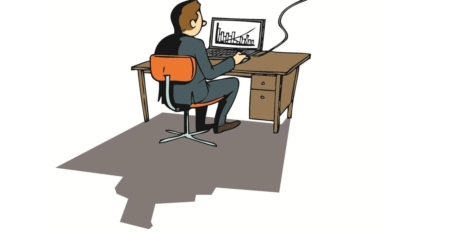February 22, 2019
When assessing workplace strategy: we should always test rather than guess
 Would an investor plow millions of dollars into a stock and never bother to track how the investment does? Of course not. Nor would they confuse the expected return on investment (ROI) with the actual results. We don’t guess about financial investments. We don’t base investment decisions on what some stranger does or how they say they’ve done. So why then, do many of the largest companies in the world invest millions of dollars in buildings or renovating their workplaces and never even bother to measure results. Why are they so willing to copy the unproven workplace strategy of others? Why are they satisfied with projected results, rather than measuring how their investments actually perform? (more…)
Would an investor plow millions of dollars into a stock and never bother to track how the investment does? Of course not. Nor would they confuse the expected return on investment (ROI) with the actual results. We don’t guess about financial investments. We don’t base investment decisions on what some stranger does or how they say they’ve done. So why then, do many of the largest companies in the world invest millions of dollars in buildings or renovating their workplaces and never even bother to measure results. Why are they so willing to copy the unproven workplace strategy of others? Why are they satisfied with projected results, rather than measuring how their investments actually perform? (more…)










 With the rise of both cloud-based technology and the worldwide gig economy, the last ten years of the 21st century have seen some near-revolutionary changes in workplace practice. Entrepreneurs everywhere have been more than happy to make use of these developments, taking advantage of the new business models these changes have brought. For example, IDG found that
With the rise of both cloud-based technology and the worldwide gig economy, the last ten years of the 21st century have seen some near-revolutionary changes in workplace practice. Entrepreneurs everywhere have been more than happy to make use of these developments, taking advantage of the new business models these changes have brought. For example, IDG found that 


 A lack of senior stakeholder support is the greatest inhibitor of change, new research suggests as despite considerable enthusiasm to innovate, organisations are being thwarted by tight resources and strong internal resistance. The data commissioned by KCOM found that organisations are also limiting themselves by turning away the specialist skills and experience that could help them advance, through overly predictive procurement processes. They are however, eager to be more competitive, which is why organisations are making big investments in innovation projects. Almost half (43 percent) consider driving digital transformation to improve competitive advantage to be their top priority in the next year. A further 32 percent are allocating at least 20 percent of their IT budget to new projects. Both public and private sector organisations are also taking an increasingly people-centric approach to digital transformation. In the next year, 80 percent said they would incentivise staff retention through training, accreditation and career development to deliver on their innovation strategy. This is compared to 71 percent who said they would do so by investing in new technologies.
A lack of senior stakeholder support is the greatest inhibitor of change, new research suggests as despite considerable enthusiasm to innovate, organisations are being thwarted by tight resources and strong internal resistance. The data commissioned by KCOM found that organisations are also limiting themselves by turning away the specialist skills and experience that could help them advance, through overly predictive procurement processes. They are however, eager to be more competitive, which is why organisations are making big investments in innovation projects. Almost half (43 percent) consider driving digital transformation to improve competitive advantage to be their top priority in the next year. A further 32 percent are allocating at least 20 percent of their IT budget to new projects. Both public and private sector organisations are also taking an increasingly people-centric approach to digital transformation. In the next year, 80 percent said they would incentivise staff retention through training, accreditation and career development to deliver on their innovation strategy. This is compared to 71 percent who said they would do so by investing in new technologies.

















February 27, 2019
The Hitchhiker’s Guide to the Workplace 0
by Mark Eltringham • Comment, Facilities management, Technology, Workplace, Workplace design
(more…)